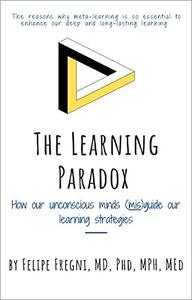
The Learning Paradox: How our unconscious minds (mis)guide our learning strategies by Felipe Fregni
English | June 9, 2021 | ASIN: B0971DJZ8H, ISBN: 173420253X | AZW3 | 98 pages | 0.2 MB
In The Learning Paradox, neuroscientist, educator, and Harvard professor, Felipe Fregni discusses how our brain architecture, combined with our current educational system, may result in superficial and short-term learning. This book is relevant for students, teachers, education systems, and individuals who seek to improve their cognitive prowess while becoming better learners.
Chapter 2 (The Ivy League Paradox) analyzes why the use of grading as the main benchmark for learning leads to poor learning outcomes. It also provides examples which suggest that companies such as Google and Goldman Sachs have realized this for a long time, and have practically abolished school grading history as a criterion for hiring.
Chapter 3 (Are There Two Marshmallows for the Learner? The Irresistible Immediate Gratification) addresses an important and frequently asked question (What motivates one to learn?) from a different angle. This chapter uses the "marshmallow" analogy from the famous Stanford experiment, to explain how we respond to immediate and delayed gratification in the context of traditional educational incentives, and how that leads to less effective learning.
Chapter 4 (Why Choosing a Coffee-Maker Makes Us Learn Less: Effects of Cognitive Dissonance on Learning) discusses how cognitive dissonance can impact learning outcomes. It analyzes how this cognitive process can render deep learning less attractive than other options, such as social activity and last-minute cramming. This is another example of how unconscious cognitive processes can hinder our learning, and how knowledge of these weaknesses can help students take a proactive approach towards their studies while resisting the temptation to take shortcuts.
Chapter 5 (A Sugar Pill for Learning: Is There a Placebo Effect in Learning?) discusses and aids the understanding of the potential impact of expectation on learning and education, by drawing upon knowledge about placebo and nocebo effects in medicine.
Chapter 6 (Does Self-Confidence Play a Role in Learning? The "Big-Fish Little-Pond" Effect) discusses how self-confidence and self-concept influence the learning process. The highly publicized case of parents using bribery to enroll their children in top universities and colleges has highlighted the excessive-and likely unnecessary-desire of the parents for their children to attend top schools. They believe such schools will generate a better learning environment for their children. This chapter challenges this idea, based on the "big-fish-little-pond" concept. Do students thrive and learn more when they are at the top of their class (namely in a less prestigious school) or vice versa? This is another example of how our unconscious minds may choose a learning environment that is not necessarily the best one.
Chapter 7 (Enhancing Learning: Metacognition as Low-Hanging Fruit?) discusses how to address hidden unconscious forces that can diminish our learning using metacognition. This chapter explains, in the context of learning, how effective use of metacognition helped Formula 1 pilot Ayrton Senna and, on the other hand, how the lack of metacognition can lead to tragic outcomes, such as that of the VARIG 254 flight. In the final appendix chapter, a guest author discusses and summarizes some recent studies using metacognition techniques to provide examples of current research regarding this topic.
Buy Premium From My Links To Get Resumable Support,Max Speed & Support Me

https://rapidgator.net/file/c483196947eb23fb79b42b45cd71a813/2d18k.The.Learning.Paradox.How.our.unconscious.minds.misguide.our.learning.strategies.rar.html

http://nitro.download/view/1A7CD96FA11E561/2d18k.The.Learning.Paradox.How.our.unconscious.minds.misguide.our.learning.strategies.rar

https://uploadgig.com/file/download/377c757e4756f4dC/2d18k.The.Learning.Paradox.How.our.unconscious.minds.misguide.our.learning.strategies.rar
